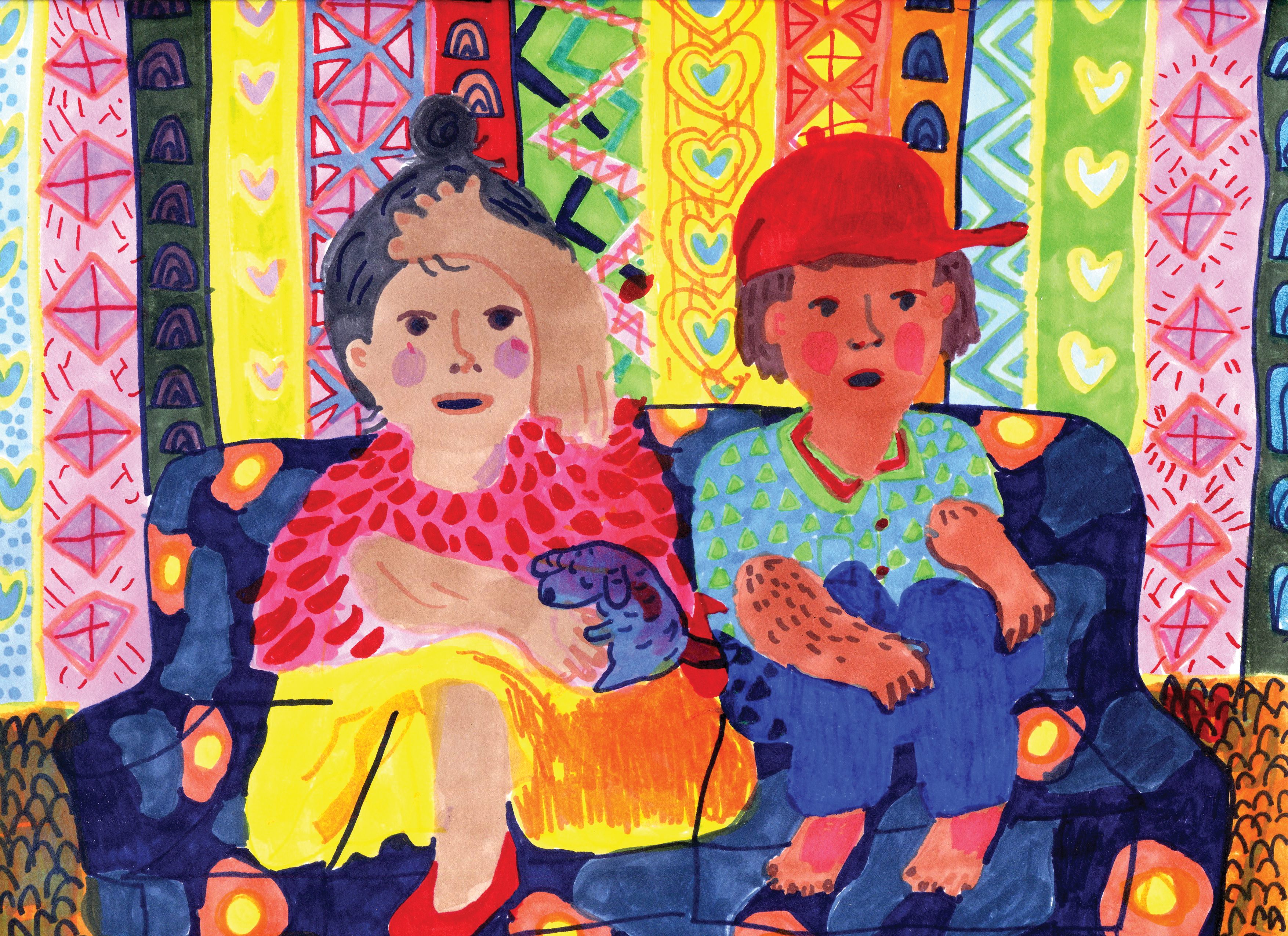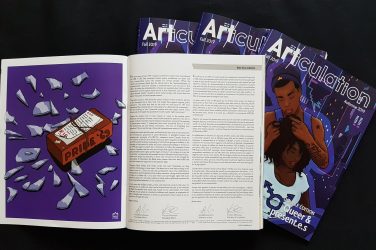Sarah Mangle, Your Puppy Knows, 2019.
Oppression is insidious and doggedly persistent. The legacy of the partial decriminalization of adult gay sex in 1969 remains controversial among scholars. Outside of criminal law, schools are fast becoming sites of conflict between homophobic and queer-affirming teaching practices—catching queer students in the crosshairs. Ostensibly low-level school board politics have become increasingly impactful on the lives of LGBTQ+ students.
This past year has seen a regression in policies aimed at including and supporting LGBTQ+ students in Ontario. In 2015, the Wynne government implemented a new sexual education curriculum for kindergarten through Grade 12 that included discussion of LGBTQ+ identities beginning in Grade 3.1 In 2018, the Ford government was elected with a platform that promised to repeal that curriculum. Shortly after the election, Ford introduced an interim curriculum for kindergarten through Grade 6, based on a 2010 version for elementary schools. First developed in 1998, the dated version does not mention consent, nor mandate discussion of gender identity at any grade level.2 It remains unclear whether teachers can still teach those and other topics from the 2015 curriculum without consequence.3
Schools are fast becoming sites of conflict between homophobic and
queer-affirming practices—catching queer students in the crosshairs.
The new interim curriculum was immediately challenged in Ontario courts and the Human Rights Tribunal of Ontario (HRTO) with disappointing results. In an application to the Ontario Superior Court, the Elementary Teachers Federation of Ontario (ETFO) argued that the new guidelines produce a “chilling” effect on teachers’ abilities to teach sex ed in a way that is inclusive and respectful. This, in turn, violates the rights of students under the Canadian Charter of Rights and Freedoms and the Ontario Human Rights Code. The Court ruled against the ETFO, saying that the interim directives did not prevent teachers from using the 2015 curriculum. Therefore, teachers were still free to teach about gender expression and sexual orientation in the classroom. Furthermore, both the Education Act and the interim guidelines require that teachers teach in a manner that is “inclusive, tolerant, and respect[s] diversity”.4
This decision was found to be binding on the HRTO. In April 2019, A.B., a trans Grade 6 student, argued that her rights under the Charter (Section 15) and the Human Rights Code were violated. The HRTO ruled that, because of the overlap with the Superior Court proceedings, it was required to rule in the same manner because A.B.’s application was moot. In other words, the decision had already been made by the Court; therefore, the HRTO could not intervene.5
In a June 2019 op-ed to The Globe and Mail, Jake Pyne argued that these decisions do not acknowledge the reality of the Ford government’s decision: “The Ford government removed nearly every reference to trans lives in the province’s K-6 sexual education curriculum, and then argued that the resulting curriculum was the same. But if there is no difference between including information about trans people, and not including it, then why go to all the trouble of removing it?”6
There are reasons to believe that a similar policy regression will take place in Alberta. In November 2017, the Notley government passed an amendment to the School Act that prevented teachers from disclosing a student’s involvement in a Gay-Straight Alliance (GSA) to parents.7 Newly-elected Premier Jason Kenney opposed the bill vehemently at the time, arguing that it should be the choice of individual teachers to disclose a student’s participation in a GSA.8 On the campaign trail in 2019, he again promised to repeal the amendment.9
Elsewhere, while predominantly progressive policies may be in place, administrative decisions at local or school board levels can derail well-meaning political intentions. As of 2017, Manitoba has a policy for including and supporting trans and gender diverse students. Similarly, the Public Schools Act mandates that all school boards have a “Respect for Human Diversity Policy” that protects the existence of GSAs.10 However, individual school boards are still empowered to adopt policies restricting the visibility of LGBTQ+ issues in the school community. The Hanover School Division in Steinbach, Manitoba is currently facing a human rights complaint over its policy barring any discussion of same-sex relationships in elementary and middle school classrooms.11
It is vital to acknowledge the school boards and teachers in Ontario, Alberta, and Manitoba who are doing courageous work to defend and celebrate their students. Indeed, pushing back against regressive policies is all the more important given the reality of LGBTQ+ students’ school experience. In 2011, the Every Class in Every School Project surveyed over 3700 straight and LGBTQ+ students across Canada about their school environments. It concluded that LGBTQ+ students, particularly trans students, regularly experience a hostile environment at schools. 64% of LGBTQ+ students reported feeling unsafe, as opposed to 15.2% of non-LGBTQ students. 78% of trans students reported feeling unsafe—a figure that makes the HRTO’s decision all the more disappointing.12
Why do curricula, policies, and seemingly low-stakes school board elections matter? Because they affect children, especially those who are the most vulnerable and the most marginalized, at a time when they need support and compassion.
Thinking of the queer children means holding our schools and school board representatives accountable. It means ensuring that essential policies safeguarding rights for LGBTQ+ students in schools are protected.
- Hauen, Jack. “The Differences between Ontario’s Interim Sex-Ed Curriculum and 2015’s.” The Globe and Mail, 4 September 2018.
- Ibid.
- “AB v. Ontario (Education).” CanLii, 18 April 2019, canlii.org/en/on/onhrt/doc/2019/2019hrto685/2019hrto685.html.
- “ETFO et al. v. Her Majesty the Queen.” CanLii, 28 February 2019.
- Supra note 3.
- Pyne, Jake. “For trans people in Ontario, the sex-ed debate feels like it’s about something else.” The Globe and Mail, 29 April 2019.
- Bennett, Dean. “Alberta legislature passes contentious Bill 24 strengthening gay-straight alliances.” Global News, 15 November 2017.
- Dubois, Stephanie, Anya Zoledziowski. “Most Albertans say parents shouldn’t be notified when child joins GSA, online survey suggests.” CBC News, 1 April 2019.
- Bennett, Dean. “United Conservative leader Kenney pledges education revamp if elected in Alberta.” Global News, 17 February 2019.
- Province of Manitoba. “The Public Schools Act.” Manitoba Laws, 8 July 2019.
- “Same-sex couple files human rights complaint against Hanover School Division.” CBC News, 20 June 2016.
- Taylor, Catherine, Tracey Peter. “Homophobia, Biphobia, and Transphobia in Canadian Schools Final Report on the First National Climate Survey on Homophobia, Biphobia, and Transphobia in Canadian Schools.” Egale Human Rights Trust, May 2011, pp. 17.












Show Comments (0)